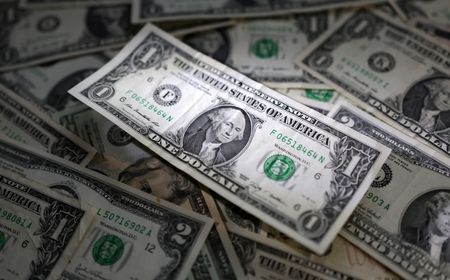By Saqib Iqbal Ahmed
NEW YORK (Reuters) -The U.S. dollar fell to a 1-week low against the euro on Thursday as German inflation data helped lift the common currency and as concerns over the banking sector receded.
Inflation eased significantly in Germany in March on the back of lower energy prices but was above forecasts, adding pressure on the European Central Bank to further tighten its monetary policy.
Separately, data showed that Spain’s consumer prices rose 3.3% year-on-year in March, the slowest pace since the 12-month period through August 2021 and less than expected by analysts.
The European Central Bank, which has made it clear future rate hikes will depend on economic data, has increased its key deposit rate by 350 basis points to 3% since July as it seeks to tame surging inflation.
“There is a divergence developing between the ECB and the Fed that is going to weigh on the dollar,” Bipan Rai, North America head of FX strategy at CIBC Capital Markets in Toronto, said.
“(European inflation data) suggests there is more work for the ECB to do and that could close the policy rate gap between the ECB and the Fed going forward,” he said.
Last week, the Federal Reserve’s Federal Open Market Committee raised interest rates by 25 basis points, as expected, but took a cautious stance on the outlook because of the banking sector turmoil.
“We believe the main pillars of U.S. dollar strength last year — aggressive tightening by the Federal Reserve and a resilient U.S. economy — are unlikely to support the currency going forward,” Mark Haefele, chief investment officer at UBS Global Wealth Management, said in a note on Thursday.
Haefele recommended increasing exposure to select G10 currencies, including the Australian dollar, the Japanese yen and the Swiss franc.
On Thursday, the euro was 0.55% higher at 1.09035, the highest since March 23. For the year, the euro was up nearly 2% after having slumped 5.7% in 2022.
“The euro was hit by a perfect storm of shocks most of last year, but things have turned considerably more positive now,” strategists at BofA Global Research said in a note.
“However, we warn that the market has once again run ahead of itself, pricing early Fed cuts, with re-pricing likely to weigh on EURUSD in the short term,” the strategists wrote.
Data on Thursday showed the number of Americans filing new claims for unemployment benefits rose moderately last week, showing no signs yet that tightening credit conditions were having a material impact on the U.S. labor market, which remains tight.
The dollar index, which measures the currency against six major peers, was 0.468% lower at 102.16.
The pound rose 0.58% against the dollar on Thursday, putting it on pace for a nearly 3% gain for March, its strongest monthly performance since November, as headline inflation in Britain showed no signs of slowing down.
In cryptocurrencies, bitcoin was about 1.6% lower on the day at $27,913, after rising to a near 1-week high of $29,170 earlier in the session. The digital currency came under pressure recently as investors worried over cryptocurrency exchange Binance and Chief Executive Changpeng Zhou being sued by the Commodity Futures Trading Commission(CFTC) over regulatory violations.
(Reporting by Saqib Iqbal Ahmed; Editing by Andrew Heavens)





